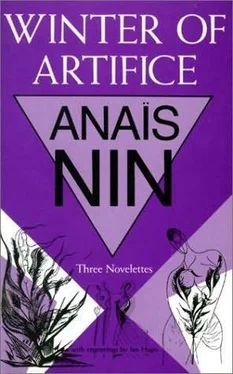Anaïs Nin - The Winter of Artifice
Здесь есть возможность читать онлайн «Anaïs Nin - The Winter of Artifice» весь текст электронной книги совершенно бесплатно (целиком полную версию без сокращений). В некоторых случаях можно слушать аудио, скачать через торрент в формате fb2 и присутствует краткое содержание. Год выпуска: 2007, Издательство: Sky Blue Press, Жанр: Классическая проза, на английском языке. Описание произведения, (предисловие) а так же отзывы посетителей доступны на портале библиотеки ЛибКат.
- Название:The Winter of Artifice
- Автор:
- Издательство:Sky Blue Press
- Жанр:
- Год:2007
- ISBN:нет данных
- Рейтинг книги:4 / 5. Голосов: 1
-
Избранное:Добавить в избранное
- Отзывы:
-
Ваша оценка:
- 80
- 1
- 2
- 3
- 4
- 5
The Winter of Artifice: краткое содержание, описание и аннотация
Предлагаем к чтению аннотацию, описание, краткое содержание или предисловие (зависит от того, что написал сам автор книги «The Winter of Artifice»). Если вы не нашли необходимую информацию о книге — напишите в комментариях, мы постараемся отыскать её.
“A handful of perfectly fold fables, and prose which is so daringly elaborate, so accurately timed… using words as magnificently colorful, evocative and imagist as any plastic combination on canvas but as mysteriously idiosyncratic as any abstract.”
—
The Winter of Artifice — читать онлайн бесплатно полную книгу (весь текст) целиком
Ниже представлен текст книги, разбитый по страницам. Система сохранения места последней прочитанной страницы, позволяет с удобством читать онлайн бесплатно книгу «The Winter of Artifice», без необходимости каждый раз заново искать на чём Вы остановились. Поставьте закладку, и сможете в любой момент перейти на страницу, на которой закончили чтение.
Интервал:
Закладка:
Anaïs Nin
THE WINTER OF ARTIFICE
Three Novelettes
To Nancy and Larry with love.
INTRODUCTION
From the publication of her first book in 1932 until the mid 1960s, Anaïs Nin was an obscure author who published books with, often, small presses, and short fiction in little magazines. With the appearance of The Diary of Anaïs Nin, 1931-1934 (1966), however, she became well known, and then increasingly popular as more volumes of her diary were published. The number of her books published since her death in 1977 confirms that her appeal continues. At least twenty books of new or mostly new material have been published as of late 2006. These include nine volumes of her diary, four of them identified as unexpurgated (these four contain some previously published material); three volumes of correspondence (with Henry Miller, David Pepperell, and Felix Pollak); two volumes of erotica, plus five books of selections from them, one illustrated with photographs and another with artwork; and a collection of stories. Another volume of erotica has been attributed to her and her friends on the basis of unconvincing evidence. Additionally, some short pieces and selections from works published during Nin’s lifetime have been collected and published as books, and one novella has been published under its own title. Such a substantial number of posthumous publications begs the question of whether worthwhile Nin writing remains unavailable. Indeed so. Nin’s third book and second volume of fiction, The Winter of Artifice , has not been republished since its initial appearance in 1939. At least one serious reader considers this collection of three novellas Nin’s major fictional accomplishment. Writing to Nin in 1960, Felix Pollak states, “I stillink it is your best book, that unexpurgated version — magic, entrancing piece of writing” (Nin and Pollak 1998, 152). [1]His assessment is debatable, though reasons for the significance of the book are not arguable: the novellas present several key characters dealing with emotional issues (a central focus in Nin’s fiction generally), they serve to illustrate Henry Miller’s influence on Nin’s prose, they indicate how Nin used diary material in her fiction, and theyprovide a basis for examining Nin as evaluator and reviser of her work.
“Djuna,” “Lilith,” and “The Voice” were all published for the first time in The Winter of Artifice . “Djuna” has never been republished in its entirety; the other novellas appear in every edition of Winter of Artifice , as Nin later named the collection, though she revised them after their 1939 publication and changed the title of one of them. [2]
Set in Paris, “Djuna” concerns Djuna’s involvement with Hans and Johanna, a couple married unhappily. Djuna, the narrator, is a writer attracted to impoverished Hans because she considers him highly intelligent and admires the manuscript he struggles to complete. His novel depicts a character inspired by Johanna, who objects to his harsh portrayal of her. Although Djuna and Hans are lovers, she views herself primarily as the nurturer of his talent, an aspect of Hans that Johanna does not value. When Johanna returns to Paris after having been away for the first two-thirds of the narrative, she and Djuna develop a closeness that becomes physical to the degree that they kiss and fondle. The night they spend together in bed concludes the novella.
Despite the drama surrounding Djuna, Hans, and Johanna, including the tension between the spouses, the novella mainly deals with the narrator’s quest for contentment. Although Djuna does not identify her problems, she acknowledges some of her deficiencies: lying to Hans so he will not think her ordinary, assuming any role in order to accommodate him, and wanting to be loved while remaining ultimately unknown.
Johanna appeals to Djuna because Hans’s wife possesses traits that Djuna lacks, needs, and desires. These include forthrightness and the ability to act decisively. Even though the two women are attracted to each other and, taken together, constitute a complete person, Johanna does not satisfy Djuna. Why? Because in loving Johanna, Djuna embraces “the desired, unrealized, unformulated half of” herself. In order to gain emotional equilibrium, Djuna must unite with her true opposite, a man, as she implies after characterizing her love for Johanna as self-love, as narcissism: “What I loved to-day [herself in Johanna], far, far above this self, was Hans. Hans, the other ” (Nin 1939, 85).
The novella concludes without resolution. Johanna plans to leave Hans for another man. If she does, Djuna will presumably have unrestricted access to Hans. A life with him might help solve her problems. Yet if Johanna does not leave Hans, Djuna must decide whether to continue her involvement with him on a less-than-ideal basis — by sharing him with Johanna — or leave him, hoping to find someone to satisfy her needs.
The second novella, “Lilith,” focuses on the narrator, Lilith, and her problems that result from her father’s abandonment of the family two decades earlier, when she was ten years old. The reunion of the daughter (a writer) and her unnamed father (a musician) in France is the occasion of Lilith’s narrative, although the text does not indicate what inspired their meeting.
Any child could be expected to interpret the permanent absence of a parent as rejection, especially after the parent treated the child insensitively when the family was intact, as happened with Lilith. Her father terrified her; he thought her ugly. His absence affected her to the degree that her life has been lonely, that she has been incapable of appreciating joyous moments, and that she has acted against her own best interest. As a way of retaliating against her demanding, perfectionist father, the adult Lilith violated their shared tastes and preferences in order to offend him. She did this by, among other things, loving only poor men, seeking ugliness, and courting danger. The effects of such actions on her are unknown.
Despite her father’s unfeeling treatment of her, the mature Lilith knows that her father acted as he did because of his own problems. She realizes that he was an inadequate parent partly because he lost faith in love after being betrayed by his betrothed, who is not identified. She also comprehends that what she perceived as his abandonment was an attempt to save himself from an untenable marriage by fleeing it. As a result of these awarenesses, Lilith forgives his fatherly shortcomings.
Understanding her father’s actions does not mean that Lilith should grant his every wish, however. Because of the effects of his father’s favoring of a daughter over him during his own childhood, Lilith’s father has been jealous of Lilith’s life independent of him. Within this context, he thinks that, in a sense, his daughter has abandoned him. Partly to protect himself against the pain that this perception causes, he implies that she should devote herself to him. His desire is unreasonable. If she commits to him, disaster would result not only because she would lack significant interaction with other people, but also because father and daughter are too similar. As Djuna learns in the first novella, Lilith knows that one must unite with one’s opposite, or at least with someone significantly different from oneself. Wisely, she does not dedicate herself to her father.
Although Lilith understands and forgives her father, she discovers that she no longer loves him. She likens the demise of her love to the death of her fetus, at a time unspecified. As it was dead, “the little girl in me was dead too. The woman had been saved. And with the little girl died the need of a father” (Nin 1939, 197). Lilith has liberated herself from the oppressive influence of her father and gained a healthy sense of her own individuality and independence. As a result, she will presumably lead a more fulfilling life than previously.
Читать дальшеИнтервал:
Закладка:
Похожие книги на «The Winter of Artifice»
Представляем Вашему вниманию похожие книги на «The Winter of Artifice» списком для выбора. Мы отобрали схожую по названию и смыслу литературу в надежде предоставить читателям больше вариантов отыскать новые, интересные, ещё непрочитанные произведения.
Обсуждение, отзывы о книге «The Winter of Artifice» и просто собственные мнения читателей. Оставьте ваши комментарии, напишите, что Вы думаете о произведении, его смысле или главных героях. Укажите что конкретно понравилось, а что нет, и почему Вы так считаете.











